How you store your coffee can make the difference between a mediocre cup and a mind-blowing brew. If you’ve been treating your coffee beans like any other pantry item, it’s time for a reality check.
Proper storage is the often overlooked pillar of great coffee, affecting everything from flavor complexity to brewing consistency. Whether you’re a home barista or just trying to upgrade your morning routine, the tips I’m going to share in this article will be very helpful!
Best Way to Store Coffee Beans
The best way to store coffee beans is in an opaque, air-tight container at room temperature. It’s ideal to place the container in a dark, cool place like a kitchen cabinet or cupboard, away from sunlight and the heat of ovens or stoves.
You can totally use a glass mason jar to store coffee beans at home if you keep it in a dark place. But for the best results, store your coffee in opaque ceramic or metal canisters with an airtight seal to keep it fresh and full of flavor.
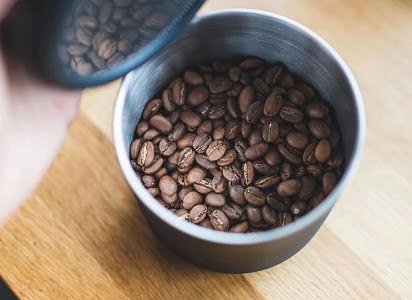
What affects the Freshness of coffee beans?
To keep your coffee fresh, you need to protect it from its three main enemies:
- Moisture: Dampness can cause mold and introduce unwanted flavors.
- Light: UV rays can break down the complex flavors in your coffee beans.
- Air: Oxygen exposure leads to oxidation, which makes your coffee taste stale.
So an airtight seal helps preserve their freshness by preventing oxidation and moisture contact and Opaque containers block out light, which can degrade the beans over time.
As an Amazon Associate, I earn commission from qualifying purchases.
What is the Best Container for Coffee Beans?
You can safely store coffee beans after opening them in basic containers like mason jars or resealable plastic bags. They’ll stay fresh for up to a month this way.
Many quality roasters and top coffee brands offer bags with built-in resealable zippers and one-way valves. These valves keep oxygen out while allowing carbon dioxide from the beans to escape.
If your coffee doesn’t come in such packaging, mason jars, repurposed bottles, or sealable plastic bags can store coffee beans for two to four weeks when kept in a consistently dark place.
If you want to store opened coffee beans for the long term, it’s essential to invest in proper coffee storage containers. These containers are designed to keep out air, light, and moisture while allowing you to push out excess air for optimal freshness.
Coffee Gator Stainless Steel Canister is an excellent container for storing coffee beans. It features an airtight seal and a one-way CO2 valve, which effectively protects the coffee from oxygen while allowing it to de-gas. This canister features a date wheel on the lid to track storage duration, a unique feature among coffee storage containers.
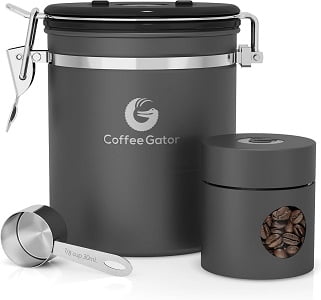
Pre-Ground vs Whole Bean Coffee
Ground coffee loses its freshness very quickly compared to whole bean coffee due to the increased surface area exposed to air. Once coffee is ground, it begins to lose flavor and aroma rapidly.
Ground coffee can stay fresh for only 30 minutes after grinding, while whole beans can stay fresh for 3-4 weeks when stored properly. The oxidation process that affects coffee flavors occurs more slowly in whole beans.
I always recommend buying fresh whole bean coffee and grinding just before brewing.
However, if you aren’t too finicky about the taste of your brew, you can buy pre-ground coffee – it’s very convenient after all. Just remember to store the coffee grounds in a good airtight canister and keep it in a cool, dark spot. Don’t just leave them in the bags they came in.
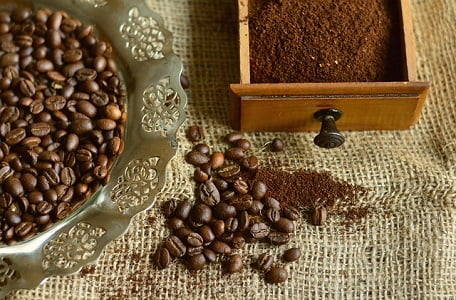
Also Read: How to Make Coffee with Whole Beans
Can You Freeze Coffee Beans?
Storing coffee beans in a freezer is not recommended especially when you plan to store beans for just a month or two. Coffee is hygroscopic in nature and readily absorbs moisture, odors, and flavors from its surroundings, which can affect its quality. So storing coffee beans in an unsealed bag in a freezer is a big no!
You can freeze coffee beans if you want to store them for a very long time (say more than a year). The main advantage of freezing beans is that it reduces the rate of oxidation, which is one of the main culprits behind coffee going stale.
To freeze coffee beans properly, it’s best to divide a large quantity into smaller portions suitable for about 1-2 weeks of use. Each portion should be vacuum-sealed to prevent air and moisture exposure.
When you’re ready to use the coffee, remove a portion from the freezer and allow it to reach room temperature before opening the sealed package. This step is crucial to prevent condensation from forming on the beans. Once thawed, the coffee should not be refrozen.
This method is very time-intensive and is typically only worthwhile for preserving exceptionally high-quality or rare coffee beans that you want to keep for six months to a year. For most coffee drinkers, this level of effort isn’t necessary.
If you must store coffee in cold conditions, the freezer is preferable to the refrigerator. You should never refrigerate the coffee beans as refrigerators have higher humidity levels and are opened frequently, which increases the risk of condensation and exposure to food odors that can compromise the flavor of coffee.
Also Read: How long does coffee last in the fridge
Best Practices to Maintain Freshness of Coffee Beans
i) Never Buy Coffee Beans in Bulk
Coffee starts losing freshness soon after roasting, and flavor and aroma diminish over time. It’s best to purchase only the amount you can easily drink within a month to ensure optimal taste.
I like this approach because it not only guarantees fresher coffee but also allows me to experiment with different roasts and origins more frequently.
iI) Never store coffee in the grinder
Never store coffee beans in the grinder hopper. Hoppers are often not airtight, expose beans to light, and can subject them to temperature and humidity changes. This can lead to faster degradation of your beans. Additionally, coffee oils can accumulate inside the grinder and damage the burrs over time.
I’ve noticed that many people make this mistake, and it’s understandable because they see it happening in coffee shops everywhere. However, good coffee shops always empty the grinder hoppers at night, store the beans properly in airtight containers, and refill the beans every morning.
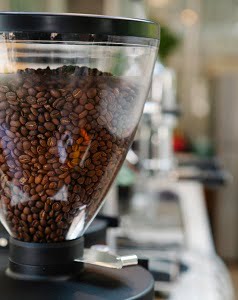
III) Grind only the amount you need
Always grind only the amount of coffee you need for immediate use. Once the coffee is ground, its surface area increases which accelerates oxidation and flavor loss.
There is a simple rule for coffee aficionados: Grind within 15 days of roasting and brew within 15 minutes of grinding.
Is Freshly Roasted Coffee the Best?
Freshly roasted coffee isn’t at its best immediately after roasting. It contains a large amount of CO2, which interferes with extraction and results in an overly bitter brew.
Coffee needs time to degas after roasting, typically 7-10 days, to reach its optimal flavor profile. The ideal freshness window for most coffees is between 10-30 days after the roast date. During this period, the beans have released excess CO2 but still retain their essential oils and flavors.
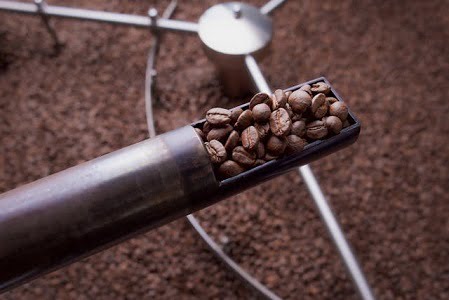
Do coffee beans expire?
Coffee beans don’t expire in the sense of becoming unsafe to drink, but they do lose freshness and flavor over time. While coffee won’t spoil like perishable foods, its quality degrades progressively after roasting, and stale coffee beans result in a dull and lackluster brew.
Most coffee packages include a best-before date, and for the best taste, it’s recommended to finish the beans by that date.
However, even within this period, proper storage is crucial. Keeping beans in an airtight container in a cool, dark place is essential to maintain their quality.
Check out related articles:
- How long does Espresso last?
- Does Nespresso Coffee Pods expire?
- How to Roast Coffee Beans
- How long are K cups Coffee Pods Good For
- Whole Beans vs Ground Coffee
- How to Keep Coffee Hot for Hours
FAQs
What to do with Stale Coffee Beans?
Don’t toss those stale coffee beans in Garbage! They might not make the best cup of joe, but they’ve got other tricks up their sleeve. Try using them in baking – they can add a nice flavor kick to desserts like tiramisu or chocolate cake. And if you’re into gardening, those old beans make great compost.
How Long Can Coffee Beans Last in a Sealed Bag?
Coffee beans can last for 9-12 months in a sealed bag. However, once the bag is opened, the beans begin to lose their freshness more rapidly due to exposure to air and moisture
How to Tell If Your Coffee Beans Are Old?
Fresh coffee beans have a strong, aromatic scent and a slightly oily surface. Old beans lose their aroma and appear dry or dull. When ground, fresh coffee produces a rich, fragrant smell, while old coffee may have little to no scent.



